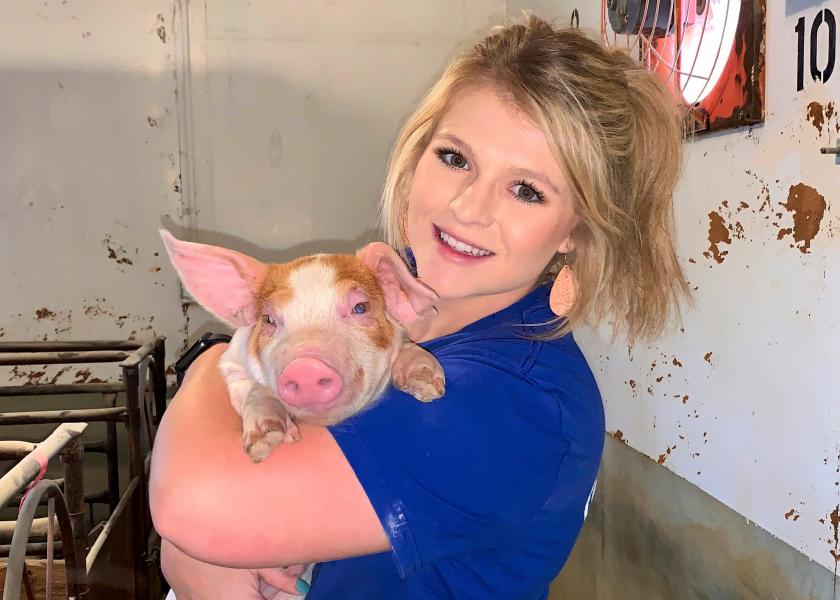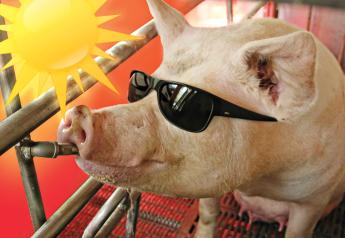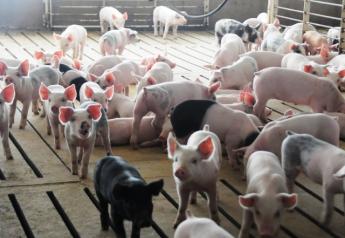Lozinski Studies Impact of Water Quality on Pig Health

Meet Brigit Lozinski, our latest addition to Farm Journal's PORK's Up & Coming Leaders feature. We are showcasing some of the fresh, new voices of the pork industry who combine innovative thought and work ethic with scientific savvy and a passion to make a difference.
Age: 23
Education: Bachelor’s degree, South Dakota State University; finishing master’s degree at the University of Minnesota in swine nutrition
Hometown: Taunton, Minnesota
Q. How did you become interested in pursuing a career in the swine industry?
A. I grew up on a family wean-to-finish operation. I took an interest in the swine industry at a young age helping unload the double deck gooseneck trailers of wean pigs and situating those pigs into the nursery. With the help of my parents, we began a small show pig operation when I was young that taught me the breeding, genetics, farrowing and marketing of pigs. Once my family sold the farm to work in management for a pork producing company, I was given the opportunity to oversee a nursery barn during high school and manage custom power washing, vaccinating and loading crews, as well as helping where labor was short and as needed for large projects. This led to more opportunities to be involved with advocacy and events throughout the years.
Q. Describe any internship experiences you’ve had.
A. I interned with Christensen Family Farms for many years, with the research team. In 2016, I completed a formal research internship with them. In 2017, I traveled to Iowa for a similar internship with Iowa Select Farms, and in 2018, prior to beginning graduate school, I interned with my master’s degree advisor Dr. Lee Johnston at the West Central Research and Outreach Center.
Q. Describe your undergraduate research experiences.
A. Although I did not have my own undergraduate research experiments, I assisted in many research projects while I served as an animal caretaker at the SDSU offsite wean-to-finish swine unit. I also maintained a relationship with Christensen Farms and my mentors there to continue some of my prior roles and contribute to research projects and development.
Q. How did you gain swine experience?
A. Alongside my working experiences and exhibiting hogs, I have attended many conferences and meetings to network and grow my connections. I had the privilege to speak at the 2020 Midwest ASAS meeting, 2020 Allen D. Leman Conference and the MN Nutrition Conference. I have presented posters at numerous conferences and was featured in a UMN research highlight video with my master’s degree research. At the Minnesota State Fair, I worked at the Oink Booth in the swine barn and was the swine barn superintendent in 2018. At SDSU, I was a teaching assistant for the online swine nutrition course and served on the swine superintendent team for the SDSU Little “I” for two years. I have toured many research facilities, slaughtering plants and have also represented pig farmers at county commissioner meetings to advocate for new barns.
Q. Tell us about your current research.
A. Water is one of the “big three” (feed, water, air) that pigs need to thrive. Many pork producers in the U.S. take water for granted due to its easy accessibility and affordability. We know when pigs are weaned, they endure extreme stress which results in the vulnerability to “falling behind.” Currently, there is minimal research available on how water quality impacts the pig and what qualifies as “good” or “bad” water quality from the pig’s view. My research has focused on water quality and its influence on nursery pig growth performance and health.
Q. What is your generation’s greatest challenge?
A. We are facing a labor shortage while the industry is trying to grow. This has resulted in overworking employees to ensure we are taking the best care of the pigs. In some cases, this is causing poor morale and working environments for employees. This puts pressure on company leaders and decision makers to recruit individuals to fill these positions, theoretically alleviating stress at the barn level. This is a challenge that likely not disappear anytime soon. My generation will be challenged with shifting the focus from a labor shortage to retention of employees. Creating an environment that makes people feel valued and want to stay is key. It’s also critical to place the right people on the right teams (in the right barns). If, as employers, we are not strategically placing our employees on teams where they will thrive, we are preparing ourselves to fail. By focusing on employee dynamics and morale, we may be able to foster greater efficiency and decrease the need for more labor.
Read about more inspiring young leaders:
Tesch Evaluates Natural Supplement for Pig Scours
Becker Explores How Essential Fatty Acids Can Improve Sow Longevity
Grohmann Uses Data to Move Pork Industry Forward







